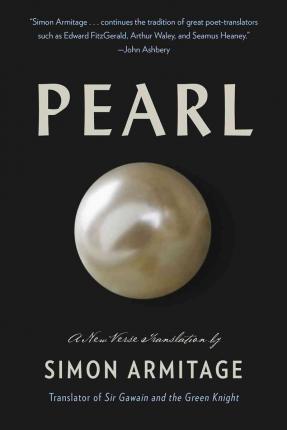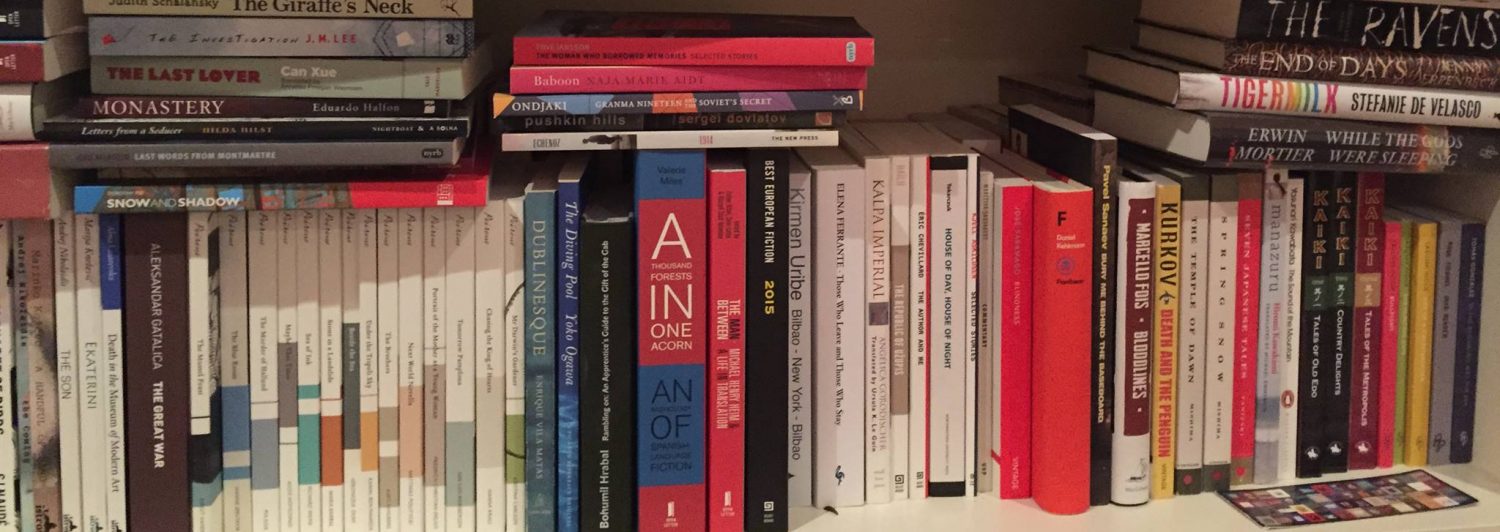
Three weeks ago I posted the Longlist for the 2017 American PEN Poetry in Translation Award and have managed to read two of the listed books. Today a short review of each, “Pearl” translated from the Middle English by Simon Armitage and “Algaravias: Echo Chamber” by Waly Salomão (translated from the Portuguese by Maryam Monalisa Ghaavi).
First up “Pearl; A New Verse Translation”. As the Introduction advises us the poem was “probably composed in the 1390’s” and “only one copy of the untitled poem that has come to be called Pearl remains in existence.” The poem is the first poem in a manuscript that also includes Sir Gawain and the Green Knight, Patience, and Cleanness (or Purity). Translator, Simon Armitage, has also translated Sir Gawain and the Green Knight and several others have translated Pearl, including JRR Tolkien.
The Introduction is compulsory reading, advising us of the intricacies of the poem;
Presented in twenty sections, each section consists of five stanzas of twelve lines, except for section XV which consists of six stanzas, bringing the total number of lines to an enigmatic 1212, thus mimicking not only the number of lines in each stanza but also the structure of the heavenly Jerusalem (twelve by twelve furlongs), with twelve gates for the twelve tribes of Israel, as specified in the Book of Revelation.
The Introduction also alerting us to the alliteration, puns, and homonyms in the original as well as the strict rhyming scheme of ababababbcb. There is then an explanation about other translators using the rhyming scheme, preserving many of the poem’s end words, and Simon Armitage’s reasoning;
My own response has been to allow rhymes to occur as naturally as possible within sentences, internally or at the end of lines, and to let half-rhymes and syllabic rhymes to play their part, and for the poem’s musical orchestration to be performed by pronounced alliteration, lopping repetition, and the quartet of beats in each line…hopefully my solution will appear to the ear and the voice.
Personally, I found this approach rather cumbersome, making the flow of a medieval poem, stilted and jarring. As an example, here is the Middle English version and the translation of one stanza (number 43);
‘”That date of yere wel knawe thys hyne.
The lorde ful erly up he ros,
To hyre workmen to hys vyne,
& fyndez ther summe to hys porpos.
Into acorde that con declyne
For a pene on a day, & forth that gotz,
Wrythen & worchen & don gret pyne,
Kerven & caggen & man hit clos.
Aboute vnder the lorde to marked totz,
& ydel men stande he fyndez therate.
‘Why stande ye ydel?’ he sayde to tos;
‘Ne knawe ye of this day no date?’
‘”All laborers know that date is a limit.
So the vineyard owner rose very early
to take on hands to tend his estate,
and found a gang of able fellows,
men who would work in the fields for a wage
of a penny a day. With the pay agreed,
they toiled at the trying a tiring tasks,
trimming and tying, cultivating the crop.
At nine the master went back to the market
where men hung about, kicking their heels.
‘Why wait here idle and aimless?’ he asked,
‘when the light of day is not limitless?’
One, the original, scans, rhymes, and is a poetic piece, the translation a literal story of a vineyard owner seeking workers.
Personally, I enjoyed the story of a man grief struck at the loss of his two-year-old daughter, his “pearl”, who visits the scene of his “bereavement” and falls into a deep sleep, where he visits the gates of heaven. There he partakes in an extended dialogue with his deceased child, across an “unfordable stretch of water”, where he learns his daughter is now one of Christ’s brides. However, the “translation” limits some of the poetic, and I found myself referring to the original text to enjoy the poetic beat and rhyme. To me a disappointing presentation.

Onto “Algaravias: Echo Chamber” by Waly Salomão (translated from the Portuguese by Maryam Monalisa Ghaavi), as “Pearl” the collection is presented in the original language alongside the translation. Here’s a bio of the poet from the publisher Ugly Duckling Presse’s website:
Waly Salomão (1943-2003) was one of the foremost 20th-century experimental poets of South America. In 1995, his fifth book of poetry, Algaravias: Echo Chamber won Brazil’s highest literary prize, the Prêmio Jabuti. Born in Jequié, Bahia, to a Syrian immigrant father and a Brazilian mother, Salomão carved out an early career as a songwriter to major Tropicália vocalists, including Gal Costa and Caetano Veloso. In 1970, at the height of Brazil’s military regime, he was imprisoned at Carandiru prison in São Paulo. The author of more than ten books, his poetry has been included in major anthologies including Nothing the Sun Could Explain: New Brazilian Poetry (Sun & Moon Press, 2000). Following the author’s death, the Waly Salomão Cultural Center was established in Rio de Janeiro.
Here is a masterful work, the opening page explaining “Algarabia” and advising “algarabía began figuratively to pass for something written or said in a way that one does not understand”, I was fearful that this would transpose to the poems, but there was no need to fear;
…where everything is balance
and calculus…
constitutes
in itself
per itself
the audacity of being a poet.
…where everything is balance
and calculus
like in Stravinsky’s music.
(from Just like Paul Valéry)
This collection is subtle and the musicality is juxtaposed against the proud closing line “POETRY IS THE ESSENTIAL”
A work that is about the creation of poetry, debating poetry and then making that a poem itself, poems that maybe from the margins, but the words are pushing outwards, extending the boundaries;
synecdoches, catachresis,
metonymies, alliterations, metaphors, oxymorons
cleared away in the chasm.
one should not anticipate many remnants
lurking at the top
of the watchtower.
(from Poem Factory)
A collection of poems that pay homage to other poets, for example the American writers Wallace Stevens and John Ashbery (both Pulitzer Prize winning poets).
With strung out poems like “Jet-Lagged Poem”, where the banality of travel and the endless lists of highlights, which are no different from others highlights, there are so many that it is easier to “lose the commas that separate them”, and the poem “Anti Travel”;
All travel is useless,
I brood at the edge of the enclosed well.
To what end abandon one’s shelter,
leave one’s turtle shell behind
And be impelled downstream by the rapids?
To what end this suspension of the
quotidian bed, if soon after
the balloon disinflates slowly and everything
resounds worse than ever before and
now in comparison looks tarnished?
This collection lingers with the “what is poetry?” question, using circular references, repetitive arguments (the “Echo Chamber” in the title being a poem and is referenced), rhythm, “polyphonic” and of course Poe.
POEtry
What is poetry?
– Poetry!
that Proteus –
like
idea…
Edgar A. Poe
I wish Ugly Duckling Presse (and of course the translator Maryam Monalisa Ghaavi) all the best with the Award (and hopefully with the Best Translated Book Award), the publisher bringing nine poetry translated works into being in 2016, representing more than 10% of translated poetry in the USA!!!
I have a few more titles from the 2017 American PEN Poetry in Translation Award on order, and have decided to subscribe to Ugly Duckling Presse’s books to support their efforts of translating poetry, so stay tuned for more thoughts on poetry in translation over the coming months.

